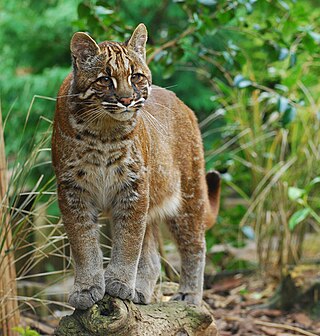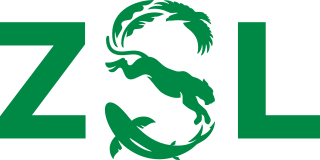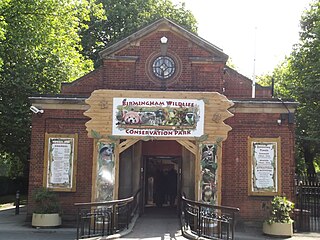London Zoo, previously known as ZSL London Zoo or London Zoological Gardens and sometimes called Regent's Park Zoo, is the world's oldest scientific zoo. It was opened in London on 27 April 1828, and was originally intended to be used as a collection for scientific study. In 1831 or 1832, the animals of the Tower of London menagerie were transferred to the zoo's collection. It was opened to the public in 1847. As of Dec 2022, it houses a collection of 14,926 individuals, making it one of the largest collections in the United Kingdom.

Marwell Zoo is a 140-acre (57 ha) zoo situated in Colden Common near Winchester, in the English county of Hampshire. It is owned and run by the registered charity Marwell Wildlife. The zoo is home to 1,208 animals of 149 species. The charity undertakes a range of educational and conservation activities, with a particular focus on Africa in addition to work from its base.

The Asian golden cat is a medium-sized wild cat native to the northeastern Indian subcontinent, Southeast Asia and China. It has been listed as Near Threatened on the IUCN Red List since 2008, and is threatened by poaching and habitat destruction, since Southeast Asian forests are undergoing the world's fastest regional deforestation.

The Zoological Society of London (ZSL) is a charity devoted to the worldwide conservation of animals and their habitats. It was founded in 1826. Since 1828, it has maintained the London Zoo, and since 1931 Whipsnade Park.

Whipsnade Zoo, formerly known as ZSL Whipsnade Zoo and Whipsnade Wild Animal Park, is a zoo and safari park located at Whipsnade, near Dunstable in Bedfordshire, England. It is one of two zoos that are owned by the Zoological Society of London (ZSL), a charity devoted to the worldwide conservation of animals and their habitats.
The Born Free Foundation is an international wildlife charity that campaigns to "Keep Wildlife in the Wild". It protects wild animals in their natural habitat, campaigns against the keeping of wild animals in captivity and rescues wild animals in need. It also promotes compassionate conservation, which takes into account the welfare of individual animals in conservation initiatives. Born Free also creates and provides educational materials and activities that reflect the charity’s values.

The Wildlife Conservation Society (WCS) is a 501(c)(3) non-governmental organization headquartered at the Bronx Zoo in New York City, that aims to conserve the world's largest wild places in 14 priority regions. Founded in 1895 as the New York Zoological Society (NYZS), the organization is now led by President and CEO Cristián Samper. WCS manages four New York City wildlife parks in addition to the Bronx Zoo: the Central Park Zoo, New York Aquarium, Prospect Park Zoo and Queens Zoo. Together these parks receive 4 million visitors per year. All of the New York City facilities are accredited by the Association of Zoos and Aquariums (AZA).

Birmingham Wildlife Conservation Park, formerly Birmingham Nature Centre, and before that Birmingham Zoo, is a small zoo on the edge of Cannon Hill Park in Birmingham, England. It is owned and managed by Birmingham City Council.

Paignton Zoo is a zoo in Paignton, Devon, England. The zoo started as a private collection in the grounds of his home, Primley House, by avid animal collector and breeder, Herbert Whitley. It was opened to the public on a number of occasions, and closed twice due to disputes with the tax authorities. On Whitley's death, the zoo was signed over to a trust, to be run as a public attraction. The zoo has a collection of about 2,000 animals representing nearly 300 species, and it also cultivates about 1,600 different species of plant.

The European Association of Zoos and Aquaria (EAZA), is an organisation for the European zoo and aquarium community that links over 340 member organisations in 41 countries. EAZA membership is open to all zoos and aquaria across Europe that comply with EAZA's standards. The organisation is administered and headquartered at Natura Artis Magistra in Amsterdam, the Netherlands.

Woburn Safari Park is a safari park located in Woburn, Bedfordshire, England. Visitors to the park can drive through exhibits, which contain species such as southern white rhino, elephants, tigers and black bears. It is part of the estates of the Duke of Bedford that also includes Woburn Abbey and its 3,000-acre (1,200 ha) deer park. The Safari Park itself covers 360 acres (150 ha).

The British and Irish Association of Zoos and Aquariums (BIAZA) is a registered charity and the professional body representing over 100 zoos and aquariums in Britain and Ireland.

A zoo is a facility in which animals are kept within enclosures for public exhibition and often bred for conservation purposes.
The EAZA Ex-situ Programme (EEP) is a population management and conservation programme by European Association of Zoos and Aquaria (EAZA) for wild animals living in European zoos. The programme was formerly known as the European Endangered Species Programme.

Species360 founded in 1974, is an international non-profit organization that maintains an online database of wild animals under human care. As of 2016, the organization serves more than 1,000 zoos, aquariums and zoological associations in 90 countries worldwide. The organization provides its members with zoological data collection and management software called ZIMS—the Zoological Information Management System.
Gordon McGregor Reid PPFLS was Director General and Chief Executive of the North of England Zoological Society, popularly known as Chester Zoo. He stepped down in 2010. The North of England Zoological Society is an independent charity for conservation, education and science. It is also one of the leading wildlife attractions in the UK, receiving well over one million paying guests each year.

Africa Alive! Zoological Reserve, formerly known as Africa Alive! and Suffolk Wildlife Park, is a zoo located in Kessingland, Suffolk, UK. It is situated off the A12 at Kessingland 2 miles (3 km) south of Lowestoft.

The Yorkshire Wildlife Park is a wildlife conservation and rehabilition centre and tourist attraction located in Branton, south-east of Doncaster, South Yorkshire, England. It opened in 2009 on the site of Brockholes Farm, a former riding school and petting zoo, and features 500 animals of 100 species. Yorkshire Wildlife Park is an official member of the British and Irish Association of Zoos and Aquariums (BIAZA) and the European Association of Zoos and Aquaria (EAZA).
Alexandra Zimmermann is a conservation scientist specialising in conflict resolution in wildlife conservation based in Oxford, England, United Kingdom. She is known for founding the IUCN Human-Wildlife Conflict Task Force and is also a researcher at the University of Oxford Wildlife Conservation Research Unit (WildCRU). She is also a Senior Advisor for the World Bank's Global Wildlife Program. She has published over 50 research papers.

The Dreamworld Wildlife Foundation (DWF) is an international non-governmental organization founded in 2012. The foundation is based at the Dreamworld amusement park on the Gold Coast, Australia. DWF primarily focuses on animal welfare.















